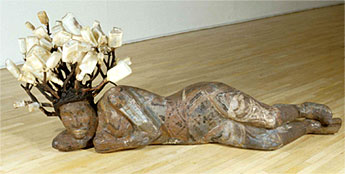 |
|
The work of Alison Saar addresses humanity in the broadest sense. Through the use of archetypal images, Saar reaches out to audiences from backgrounds as culturally and ethnically diverse as her own. Her mother, well-known artist Betye Saar, has European, Native American, and African American ancestors; her father, Richard Saar, painter turned conservator, is of German and Scottish origin. Fragments of lore, myth and legend as well as the practices of the everyday, rooted in these cultural backgrounds, are woven into Saar's powerful images, where contemporary expression enshrines centuries of man's spiritual evolution.
|
 |
— Compton Nocturne, 1999 —

wood, tin, bottles, paint, tar
33 x 80 x 28 inches |
 |
|
Alison Saar was born in 1956 and grew up in Laurel Canyon, California. She sees her upbringing as rural and her understanding and love of nature are rooted in that experience. Both parents encouraged their three talented daughters, all artists, to look at a wide range of art. They were given books on art and were taken to area museums. They also saw Outsider Art, such as the visionary artist Simon Rodia's famous Watts Towers in Los Angeles, a group of three monumental structures of pottery-encrusted steel tubing reaching 100 feet, and Grandma Prisbrey's Bottle Village in Simi Valley, a complex of buildings with walls from discarded bottles joined with cement. Alison's fascination with vernacular folk art and the visionary artist's ability to build an oasis of beauty from cast-off objects had a profound and lasting influence on her.
During high school, Alison began assisting her father in his restoration work. Dealing with artifacts from different cultures — Chinese frescoes, Egyptian mummies, and Precolumbian and African art — taught Alison about properties of various materials, techniques, and aesthetics. At Scripps College, Saar studied with Dr. Samella Lewis, a noted scholar in the field of African and Caribbean art. Having taken more art history courses than studio classes, she graduated with a thesis on Southern African American Folk Art. Saar did graduate work at Otis-Parsons Institute. |
| |
|
 |